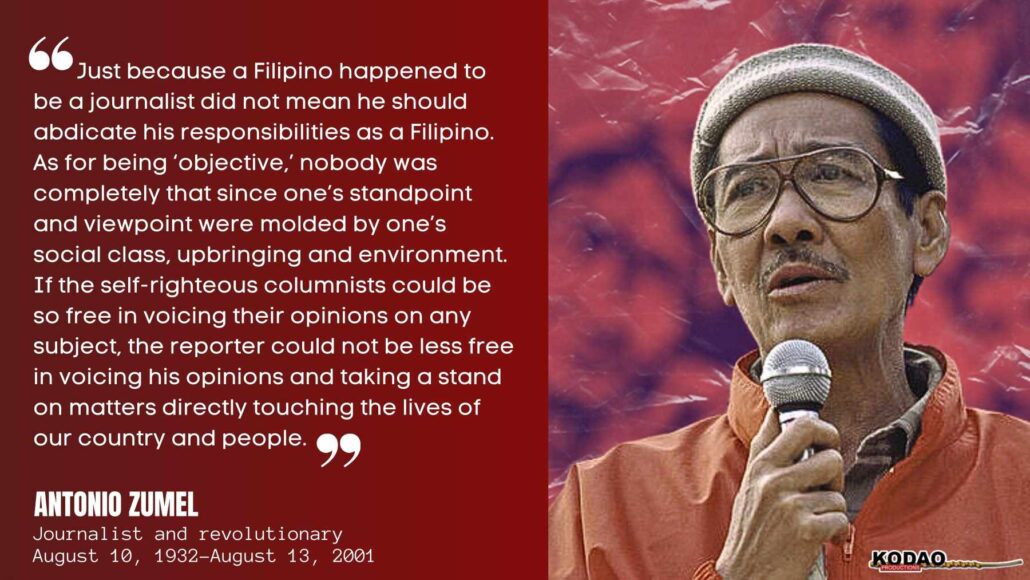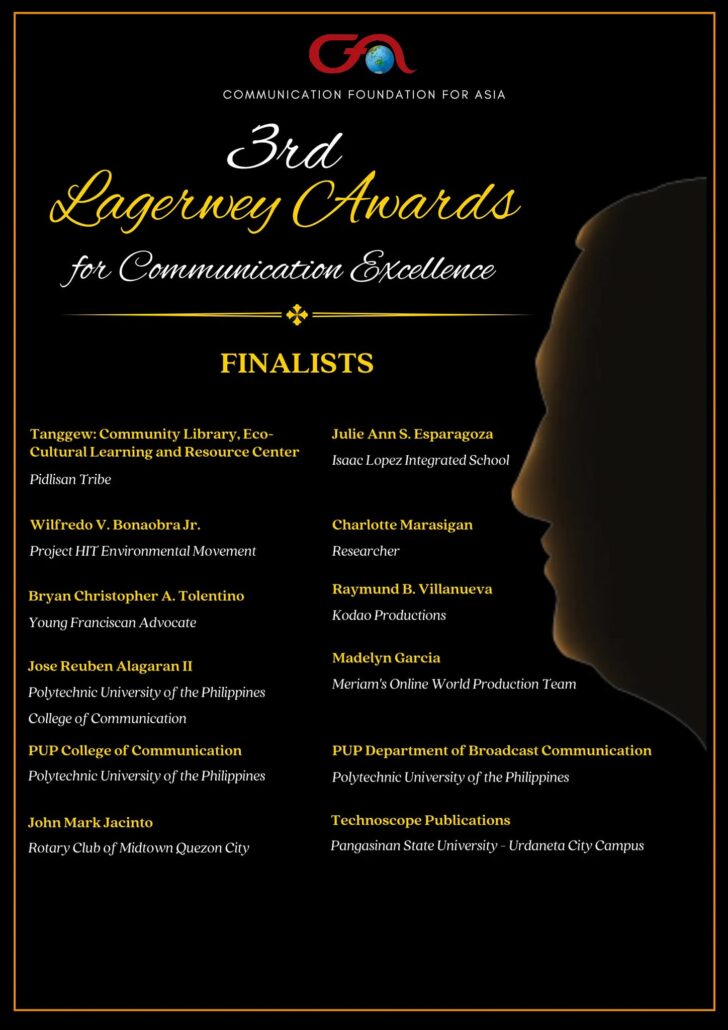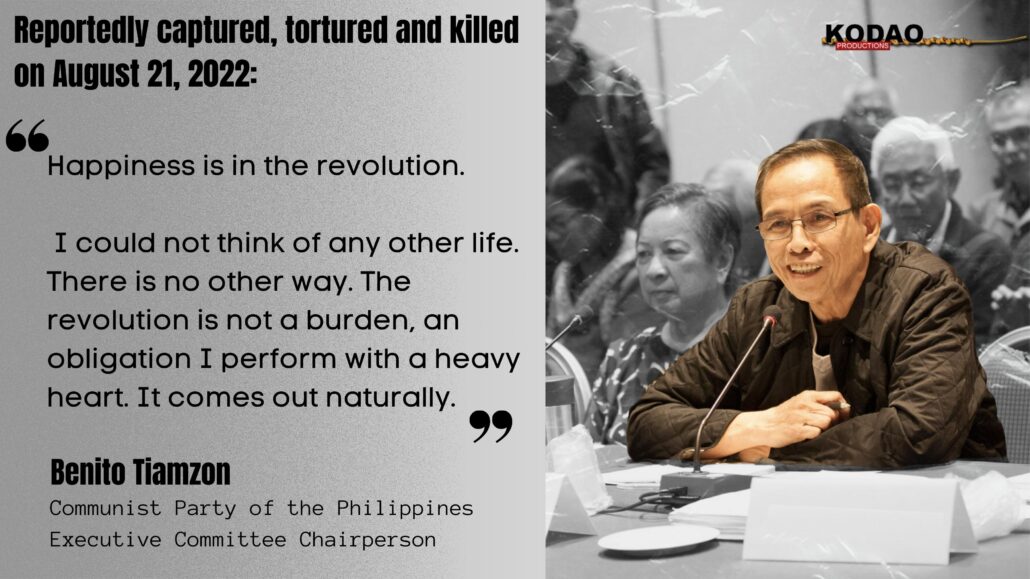Human rights lawyers condemned the brutal deaths of their clients Benito and Wilma Tiamzon, calling it a “grave breach of international humanitarian law (IHL).”
In separate statements, the National Union of Peoples’ Lawyers (NUPL) and the Public Interest Law Center (PILC) called for accountability for the deaths of Benito, Communist Party of the Philippines (CPP) executive committee chairperson, and his wife Wilma, CPP central committee secretary general between August 21 and 22, 2023.
“The reported manner of killings, signs of torture on the unarmed victims’ bodies and the insidious cover-up involving the explosion and sinking of a ‘hostile boat’ in the waters of Catbalogan City…all point to the commission of war crimes by the military,” the NUPL said.
“These grave breaches of (IHL) expose the injustice of the current counterterrorism framework, which blurs the distinction between armed conflict and terrorism, enables the arbitrary terrorist designation of parties to the protracted armed struggle, and enfeebles the application of protective legal norms to hors de combat, prisoners of war, and protected persons,” the group said.
The PILC for its part said the loss of a client in a savage extrajudicial killing in the midst of unresolved injustices is far worse painful than the loss of a case in court.
“The news about the brutal killing of our clients Benito and Wilma Tiamzon, with eight companions, shows how the system has failed again,” the PILC said.
The law firm said the Tiamzons first became their clients upon their arrest in Cebu in March 2014, a difficult task since they were branded as “enemies the state” given their extensive knowledge of the nature and problems of Philippine society and deep involvement in the armed struggle to bring about structural change.
“Contrary to the vilification, they were both level-headed, patient, and soft spoken. They would often give us insightful analysis of the case. Our conversations with them as our clients taught us to be more meticulous and analytical in our work,” they said.
Peace warriors
The Tiamzons were released from jail by the previous Rodrigo Duterte administration to participate in formal peace negotiations in Europe between the Government of the Republic of the Philippines (GRP) and the National Democratic Front of the Philippines (NDFP).
Formal talks lasted less than a year, between 2016 and 2017, but was enough for the Tiamzons to make their mark in the process, PILC said.
“[I]n the peace negotiations with the Philippine government, they provided significant contributions with the sincere aim of reflecting in the agreement the aspirations of the oppressed Filipino masses,” the law firm said.
The Tiamzons actively participated during the discussions on specific provisions of the Comprehensive Agreement on Social and Economic Reforms (CASER), the most substantive of the four peace talks agenda that includes respect for human rights and international humanitarian law, political and constitutional reforms (PCR), and cessation of hostilities and disposition of forces (CHDP) as laid down by the parties in their Joint Hague Declaration signed in September 1992.
Even while the drafting of a common draft of the CASER was still being finalized, Benito and Wilma had already started work on the next agenda of the peace negotiations, their lawyers said.
Benito, aside from being a member of the NDFP negotiating panel, was also the head of the reciprocal working group tasked to study the agenda on the PCR, while Wilma was the head of the reciprocal working group assigned to research and draft proposed provisions on the agenda of CHDP.
The peace negotiations could have been an opportunity for the Philippine government to end the armed conflict and achieve a just and lasting peace, PILC narrated.
Where are government’s obligations?
In an announcement Monday, the CPP reported the Tiamzons and eight others were caught in a military dragnet near Catbalogan on August 21 last year.
The revolutionary group added the Tiamzons were severely beaten and their bodies subsequently blown up off the coast of Samar province in what the Armed Forces of the Philippines (AFP) described was a running firefight.
Former AFP officials involved in the said incident denied CPP’s allegations, pointing out that DNA tests being conucted abroad have yet to confirm if body parts recovered from the scene belonged to the Tiamzons.
The NUPL however still called on the Manila government to fulfill its obligation to respect and ensure respect for international humanitarian law in all circumstances as stated in the Geneva Conventions of 1949 and their Protocols, the domestic Philippine Act on Crimes Against International Humanitarian Law, Genocide and Other Crimes Against Humanity, and even the Comprehensive Agreement on Respect for Human Rights and International Humanitarian Law (CARHRIHL) signed by both the GRP and the NDFP as a mutual agreement connected with the peace process between the parties.
“This non-derogable obligation includes the duty to recognize the equal applicability of international humanitarian law to both parties of an armed conflict and to hold the military to account for the inhumane treatment and deaths not only of the Tiamzon spouses but of many other casualties of its war crimes,” they said
Fraternity condoles
Meanwhile, Benito’s University of the Philippines (UP) Alpha Sigma Fraternity brothers expressed condolences for the death of their member they described as having lived their brotherhood’s principles.
Benito was a member of the fraternity’s 1969-D batch, indicating the year of his entry into the group.
“Bilang isang miyembro ng aming kapatiran, naging malaki ang naging kontribusyon ni Brod Benito, at ang kanyang bunga ay naramdaman din sa labas ng aming organisasyon. Ang kanyang liderato at aktibismo, sa loob at labas ng Unibersidad ng Pilipinas, ay nag-iwan ng hindi malilimutang marka sa aming kapatiran at sa lipunan na pinagsisilbihan namin. Ang kanyang dedikasyon at matatag na paninindigan para sa mga tao ay nagbigay inspirasyon sa aming lahat,” the group in its message said.
(As a member of our brotherhood, Benito’s contributions had been immense that we feel even outside of the organization. His leadership and activist, within and outside UP, leave an unforgettable mark on our fraternity and the society we serve. His dedication and unflinching principles inspire us all.)
“Bilang isang kapatiran, nangangako kami na patuloy na itataguyod ang aming pinakamataas na layunin na Alay sa Sambayanan na isinabuhay ni Brod Benito at Wilma Austria at patuloy na maglilingkod sa mga tao upang makagawa ng positibong pagbabago sa ating lipunan. Taos-puso naming ipinagmamalaki si Brod Benito bilang isang tunay na myembro ng UP Alpha Sigma Fraternity na hanggang sa dulo ng kanyang buhay ay ubos lakas na pinaglilingkuran ang sambayanan,” it added.
(As a brotherhood, we vow to pursue our loftiest ideal of serving the people that our brother Benito and Wilma lived by to bring about positive changes in society. We are wholeheartedly proud of Brother Benito as a genuine member of the UP Alpha sigma Fraternity who until the end of his life gave his all for the people.) # (Raymund B. Villanueva)



